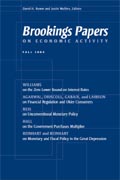In week 13 of Donald Trump’s presidency, here’s an update on what Brookings experts are saying in the first 100 days about the Trump administration’s policy choices, personnel decisions, and engagements with global and domestic events. To receive daily updates on new Brookings research, commentary, and events, subscribe to our newsletters.
On Monday April 24, Brookings hosts a half-day forum to look back on the first 100 days of the Trump presidency and look ahead to the future.
Read what Brookings experts had to say about the First 100 Days in: Week Twelve | Week Eleven | Week Ten | Week Nine | Week Eight | Week Seven | Week Six | Week Five | Week Four | Week Three | Week Two | Week One.
ON FOREIGN & NATIONAL SECURITY POLICY
Daniel Byman cautions that the Trump administration “should recognize that Saudi Arabia is vital to the struggle to defeat the Islamic State, al-Qaida and other jihadist groups. But it is not a friend.”
Thomas Wright comments on President Trump’s apparent reversal of his campaign rhetoric that NATO is “obsolete.” Watch:
Itamar Rabinovich makes a case that the Trump administration should consider as its next move in Syria working with Israel and Jordan to build a “southern Syria” that “could become an area suitable for no-fly and safe zones, where a fresh pro-Western militia could be built.”
Ted Piccone talks about the direction of U.S.-Cuba relations under the Trump administration.
Douglas Rediker says that President Trump’s apparent support for Fed Chair Janet Yellen voiced in a recent Wall Street Journal interview—a departure from his campaign rhetoric—is not surprising given that her possible replacements might pursue more hawkish monetary policy in the form of rate hikes that could risk his economic growth agenda.
ON DOMESTIC & ECONOMIC POLICY
John Hudak says that rhetoric from Trump administration officials shows that its marijuana policy is contradictory and unclear, and that the president should “set his administration on the same track and indicate the manner in which he wants policy carried out.”
Experts from the Health Policy Center at Brookings argue that the Trump administration and Congress are fostering “intense uncertainty” on the rules of the health care markets by not committing to funding the Affordable Care Act’s cost-sharing reduction subsidies or enforcing the individual mandate. They say that “toying with such funding as a bargaining chip is not productive and will inject a level of uncertainty that is too high for insurers to participate.”
William Galston addresses the Office of Management and Budget’s directive to federal agencies to cut personnel, and says that this effort may prove to be counterproductive. Watch:
—
For more details policy recommendations and analyses from Brookings experts for the new administration, see “Brookings Big Ideas for America” on issues including the threatened middle-class dream in America, health care, criminal justice reform, infrastructure, U.S. alliances, nuclear weapons, terrorism, and regional conflicts.




Commentary
President Trump’s First 100 Days: What Brookings experts are saying, 4/21/17
April 21, 2017